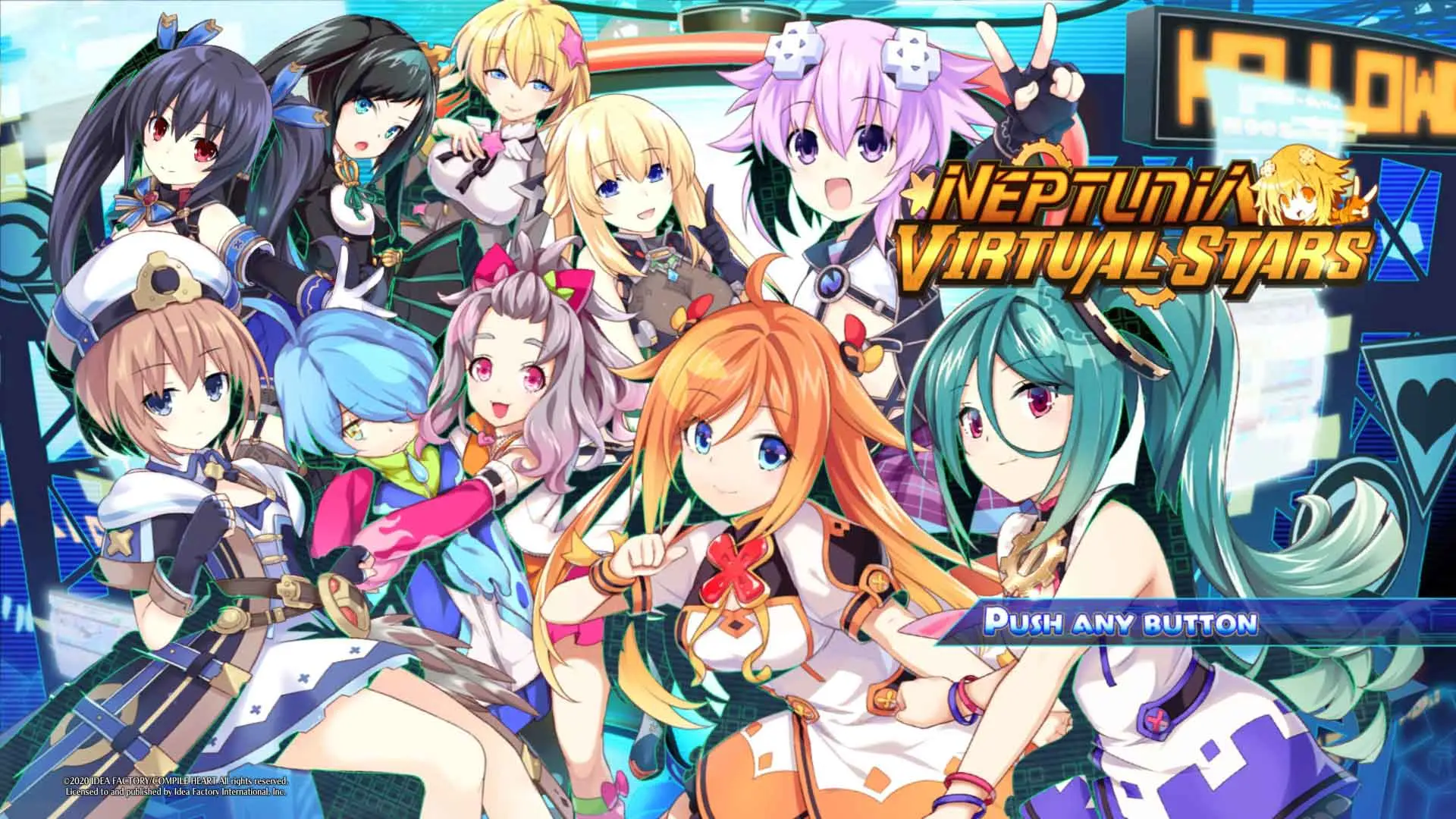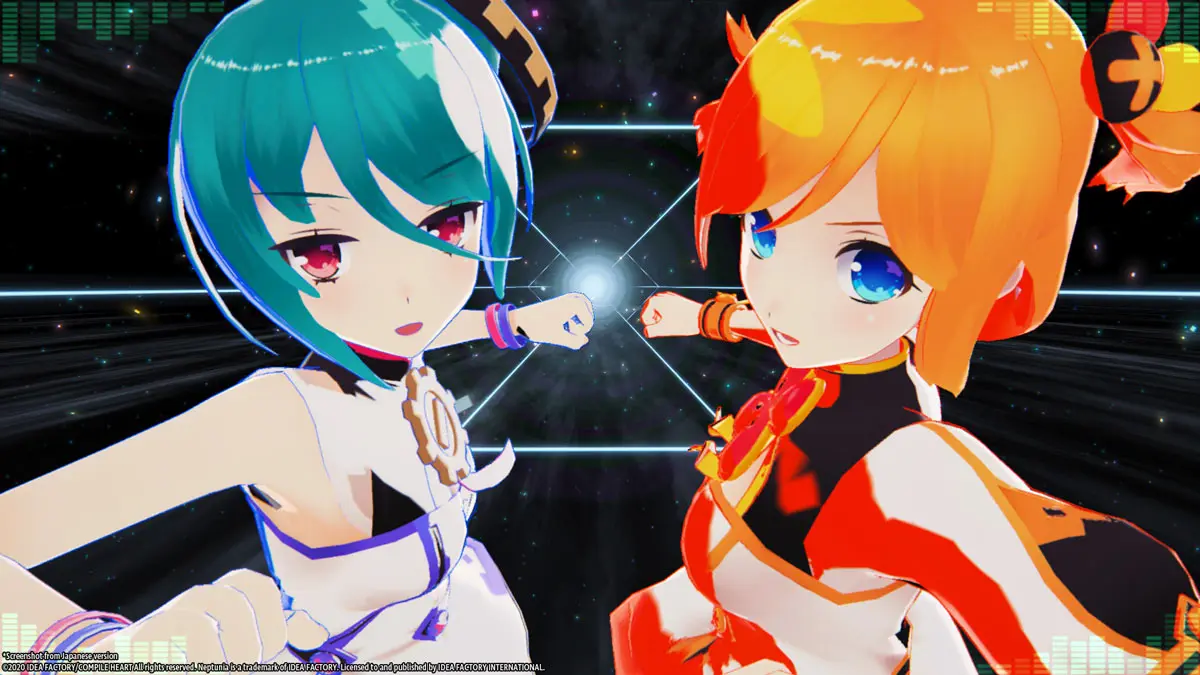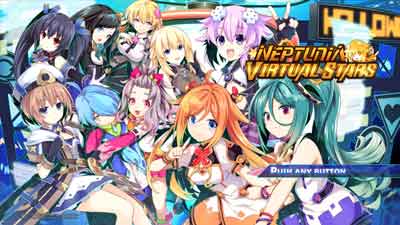
Full disclosure: Neptunia Virtual Stars is about as far outside of my usual comfort zone as I go with video games, whether I’m playing them just because I want to or playing them to review. I knew this going into it, and I prepared myself accordingly.
I’m not a fan of the whole “fan service” thing in anime, and Neptunia is clearly designed with that in mind. But it’s also got an interesting concept, and it is all very “meta,” which I appreciate when it’s done correctly.
I quickly found that I was swimming against the current for the first few hours of the game, and I was extremely confused about how certain mechanics actually worked. Surprisingly, I wasn’t having a bad time, though. I found its opening parts to be excessively confusing and visually overstimulating, and I really struggled to make sense of some pretty basic ideas that the game was throwing at me.
This was partly because Neptunia Virtual Stars does not feature any English-dubbed voice acting (although it does have English subtitles), and I had absolutely no familiarity with the franchise before I decided to try this installment. That’s particularly unfortunate in this instance, because to my understanding, Virtual Stars is something of a greatest hits compilation for the entire series canon and its digitally-based universe. Neptunia somehow charmed me into liking its sense of humor, its eclectic cast of doe-eyed, pastel-hair-colored pop idols, and ridiculous character and enemy designs just enough to figure it all out.
I felt more determined as the addictive, XP-grinding gameplay loop slowly began to sink its hooks into me and as I actually learned the advanced mechanics, which were quite poorly explained in the game’s text-heavy “tutorials.” When everything started to click, I was actually enjoying it quite a bit, even if I could never wrap my head around all of the details of the plot and the ridiculous amount of characters and NPCs that pop up over the course of the story.
I still find it pretty difficult to describe just how everything in this game works, so here’s my best effort. Neptunia is a third-person JRPG/action/shooter/dungeon-crawler. It uses dialogue-heavy story scenes to break up the exploration and simple puzzle-solving found in each level. It really kicks into a higher gear with its fast-paced combat system, which is frankly quite deep and loaded with a huge variety of customization options.
How you play with each of the different playable characters can be highly specialized. Their individual attacks and weapons make them feel quite unique to begin with, and you’re able to tinker with their stats and abilities to your heart’s content. For now, let’s put a bookmark on the subject of the gameplay. I’ll get back to that, but I’d like to finish the conversation about the game’s plot and progression.
The plot thickens
The story was pretty difficult for me to pick up on, but you start with a group of four nerdy, game-playing social media influencers who yearn for viral fame and fortune – like just about everyone else that was born after 2000, it seems. After trying to jump into the latest VR video game together, the girls are inadvertently sucked into the digital world.

They quickly discover that they are actually “goddesses” with special powers. They also find themselves teaming up with a popular group of pop idols who also mysteriously ended up getting Tron treatment. You are tasked with saving a bunch of virtual planets that are under attack by enemy forces that want to make them “obsolete,” which will happen if they are allowed to wipe out all of the creative, user-created content that is found in each realm.
It’s a lot to take in
So if we’re counting, you begin the game with six main characters, and you encounter even more over the course of the next few chapters. If you include all of the side characters and NPCs that pop up in the first thirty minutes of the story, you begin to see how Neptunia can be a bit overwhelming. I had a hard time even just remembering the names of all the random faces, even for important characters in the plot.
I feel like this is almost intentional, especially when you take into account that your actions in the game are always being watched, as you’re actually being live-streamed to a bunch of adoring fans, fellow streamers, and fame-hungry influencers. As you play through each stage, you can look up and see monitors that show clips and special messages from your ever-expanding follower list. They’ll even send you digital “gifts,” in the form of items, new gear, and even upgrades for your skills.
It’s really on-point for the whole streamer/influencer theme that Neptunia is clearly going for. So I never really decided if I wanted to shake my fist at it for being a lot of “noise” or if I just wanted to grin and laugh at the sheer meta factor of it all. I enjoyed a lot of the references to social media culture and the things that are an everyday part of life when your life revolves around the rush of going viral.
My only real complaint is that all of these long, dialogue-intensive sequences throughout the game would have been a LOT more impressive and entertaining if they were fully animated. Instead, we get static, motionless talking faces that you spend so much time listening to. By all means, the characters are still expressive – and despite being motionless in every other way, they’re quite “jiggly,” which will surely appeal to the target audience.
It just doesn’t make a lot of sense to me that the series goes so heavy on its anime themes and doesn’t roll out much in the way of actual animation in the cutscenes. Now, with those comments out of the way, I want to get back to the mechanics and highlight more about the gameplay, because there are still a few high points – and unfortunately some low ones as well.
Rough around the edges
I’ll get the bad news out of the way: Neptunia feels pretty rough around the edges, to put it best. The controls aren’t terrible, but they’re definitely awkward. I think that’s absolutely a symptom of having six characters to switch through, simultaneously, in a real-time battle system that is equal parts third-person shooter, and third-person hack-and-slasher.
You see, the four girls you begin the game with – the main character and Neptune’s crew – they carry projectile weapons. Plus, they all have the ability to slide around quickly. It’s a lot like Vanquish, actually, and I really liked zipping around the combat arenas as I blasted away at my foes.
Each of the four characters has a different style of weapon. For example, Neptune’s is like an automatic rifle that has solid range and decent damage. Vert’s is a shotgun that is ideal for close-range shots, while Blanc’s is a slow-charging precision rifle with a very powerful blast. They’ve all got special attacks that consume MP and have a variety of effects, but they are all generally performed by pointing at a target and pressing a button combo to unleash a ton of damage.
Me and You
Here’s the thing: when you switch to the two other characters – the pop idols, oddly named Me and You – the controls change. The game mechanics feel more like a hack-and-slash action game, with lock-on targeting and so on. Me uses a sword-like weapon, and You fires a bow. So it’s not all close-range combat, but the control layout certainly favors taking the melee route.
Oddly, your health bar and stats completely change. Instead of having a life bar where each hit causes a single chunk of damage, these characters have an HP total. They also gain a defensive stat that the other characters don’t even have to worry about. You lose the ability to slide around quickly. Instead, you can dodge-roll (or air-dash, if you’re in the air).

The button-mashing combos for these characters are functional, but I felt like the controls get really “sticky.” The lock-on targeting system didn’t work very well most of the time, which made the camera go absolutely nuts. You can see where I’m going here.
I actually thought the special attacks were easier to pull off with these characters – thanks to the target lock – but I still generally got lost in the action because the camera couldn’t handle any of it. It’s a shame because there were a few moments that I felt like the combat system actually worked well. I was able to chain together combos of quick attacks and alternating special moves with some finesse, but those moments were not really the norm, by any stretch of the imagination.
Fortunately, thanks to all those customization options I mentioned earlier, and the depth of the “V-Chips” upgrade system, you can work around this by making the other characters more powerful. By the time I was halfway through the game, Neptune and Co. could basically vaporize anything dangerous that appeared in front of me within seconds. The only time that it seemed necessary or required to switch to the other characters was if I needed to jump a bit further to reach a platform and progress through the stage. I also preferred using Neptune simply because I could zip through the maze-like stages that much quicker, and her rapid-firing weapon ultimately turned into an enemy-melting bullet hose, which made the process of XP-grinding and farming for rare items that much less of a pain in the ass.
To its credit, at least I always wanted to do the farming for those items in Neptunia, and I enjoyed the addictive nature of the grind that was necessary to power-level my way through each of the virtual realms in the game.
If we’re being honest, isn’t that truly the sign of a solid JRPG – when you go into that little trance, and you don’t even notice that you’re basically just investing your time to make a bunch of numbers get bigger, so you can kill bigger bad guys, and get rewarded with goodies that also make the numbers get bigger, ad nauseum?
Conclusion
To wrap this up, I must acknowledge that there are a lot of little things in Neptunia that I have not mentioned in this review. I have not finished the entire story yet, but I fully intend to – because the forty hours I put into it so far have been mostly pretty solid. I quite like the fact that I can just turn my brain off and enjoy the gameplay loop of zipping around the stages, zapping at the colorful bad guys, and being flooded with the explosions of items and gems and colors after each mob of enemies is exterminated.
When I started this one, it felt like jumping into a freezing cold pool of water, but I felt compelled to trudge through it, and I’m glad that I did. I think that anyone who enjoys this franchise will find a lot to like from this game, and anyone looking for a solid JRPG/action/shooter game could do a lot worse than giving this a shot, especially if you’re also a fan of the most cringe-inducing styles of anime, or you’re amused by streaming, influencers, and social media culture.
Granted, I can’t say that Neptunia Virtual Stars is even close to “excellent,” but it is at least a very solid game that survives being a bit rough around the edges mechanically just by being intriguing, colorful, and charming enough that you won’t really mind.
Game Freaks 365 received a review copy.
